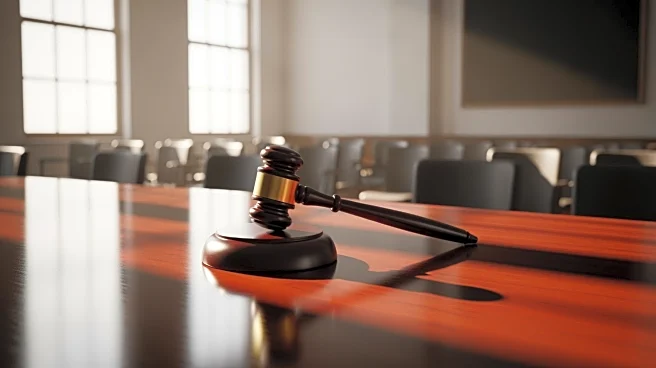What's Happening?
Sean Charles Dunn, a former international affairs specialist at the Justice Department, is on trial for allegedly assaulting a federal agent by throwing a sandwich at him. The incident occurred outside a nightclub in Washington, D.C., during a 'Latin
Night' event. Dunn reportedly approached a group of Customs and Border Protection agents, calling them 'fascists' and 'racists' before throwing the sandwich. The case has gained attention as a symbol of resistance against President Trump's law enforcement surge in the capital. Despite a grand jury's refusal to indict Dunn on a felony assault charge, U.S. Attorney Jeanine Pirro's office has charged him with a misdemeanor. The trial is expected to last two days, with the judge describing it as 'the simplest case in the world.'
Why It's Important?
The trial highlights tensions between local residents and federal law enforcement in Washington, D.C., particularly in the context of President Trump's deployment of federal agents to assist with police patrols. Dunn's case has sparked debate over selective prosecution, with his lawyers arguing that he was targeted for his political speech. The outcome of the trial could set a precedent for how similar cases are handled, especially in a city that has been resistant to federal intervention. The case also raises questions about the balance between free speech and law enforcement, as well as the implications of political bias in legal proceedings.
What's Next?
The trial is set to proceed with opening statements and witness testimonies, including the agent struck by the sandwich. Dunn's lawyers have requested the dismissal of the case, citing vindictive and selective prosecution. The judge has denied requests to restart jury selection in open court. The trial's outcome could influence future legal actions against individuals involved in protests or confrontations with federal agents. It may also impact public perception of federal law enforcement's role in local jurisdictions.
Beyond the Headlines
The case underscores the cultural and political divide in Washington, D.C., where murals glorifying Dunn's actions have appeared. It also reflects broader national debates about the role of federal law enforcement and the rights of individuals to protest government actions. The trial could have long-term implications for how political dissent is treated in legal contexts, particularly under administrations with differing political agendas.















